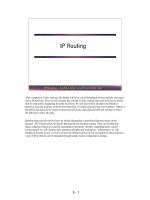Tài liệu FRAME RELAY pptx
Bạn đang xem bản rút gọn của tài liệu. Xem và tải ngay bản đầy đủ của tài liệu tại đây (94.08 KB, 1 trang )
FRAME RELAY
Key Commands Shows and Debugs
Encapsulation frame relay
ip address 10.1.4.2 255.255.255.0
encapsulation frame-relay
frame-relay map ip 10.1.4.1 43 broadcast
frame-relay map appletalk 18.2 10 broadcast
frame-relay interface-dlci 42
Frame Relay DE Support:
Frame-relay de-list 3 protocol ip gt 512 <- packets > 512 byt
!
interface serial 0
encapsulation frame-relay
frame-relay de-group 3
Show frame pvc
Show frame lmi
Show frame map
Related:
Show ip ospf interface serial X
Make sure the network type is same!
Command shows RID, net type and neighbors
Clear frame inarp
Show frame route
Additional Commands Notes
frame-relay switching
interface serial 0
frame-relay intf-type dce
frame-relay lmi-type cisco
clock rate 56000
frame-relay router 102 interface serial 1 106
Frame-relay traffic shaping:
Map-class frame-relay MyClass
Frame-relay adaptive-shaping becn <- becn support
Frame-relay cir 56000 <- defines cie value for TS
Frame-relay bc 1100 <- defines a Bc value for TS
Frame-relay mincir 1000 <- def min cir for TS
!
interface serial 0
encapsulation frame-relay
frame-relay traffic shaping
frame-relay class MyClass
• Split horizon is disabled on frame-relay
physical IP interfaces
• Split horizon is enabled on pt-to-pt IP sub-int
• Split H is enabled on pt-to-multipt IP sub-int
• If Split H is disabled on physical ints, that
interface is subject to routing loops. Use
distribution lists!
• Use the “ip ospf network” command!
• Check the lmi-type on frame switch in
troubleshooting phase if LMI not working right
• If spokes are on physical interfaces, RE-ENABLE
SPLIT-HORIZON! Off by default on physical
interfaces
• If REQUIRED to have different ospf network types
at each end, then must manually adjust the ospf
timers with “ip ospf hello-interval”, “ip ospf
dead-interval” and “ip ospf retransmit-interval”
Spot The Issue Notes
• Debug frame packet shows “encapsupation
failed”. This is normally due to a point-to-
multipoint circuit not having a proper “frame
relay map ip” statement pointing to the
remote DLCI.
• Entering a frame-map statement disables
inverse-arp for that protocol on that DLCI.
Problem is acute on spoke links: in0arp
resolves hub, no problem. Frame-map to other
spokes through same DLCI, “show frame map”
has both in. Problem is in-arp is disabled
for that DLCI. Hub address is still mapped
from initial in-arp. On reload, since a
frame-map is there, the hub is NOT resolved.
If you map one, map them all.
• Enter frame-map BEFORE no shut the interface,
otherwise 0.0.0.0 entries will appear in show
frame map. If so, save and reload.
• Look for ACTIVE in show frame pvc
• INACTIVE means you are talking to the switch
properly, but the remote side is not
• DELETED means that you are not talking to the
switch properly or the switch is
misconfigured.
• Consecutive “show frame lmi” will have an
increasing counter of in-packets. Use this
to verify connectivity
• In-arp won’t work from spoke to spoke. Need
to configure a frame-map.
• Can also configure point-to-point interfaces,
better, but might not be allowed in the lab.
• ALWAYS USE THE BROADCAST STATEMENT IN FRAME-
RELAY MAPS!!!
• Put neighbor statements on ospf network type
non-broadcast. Only for DR/BDR candidates.
Won’t show up in the configs if priority 0









